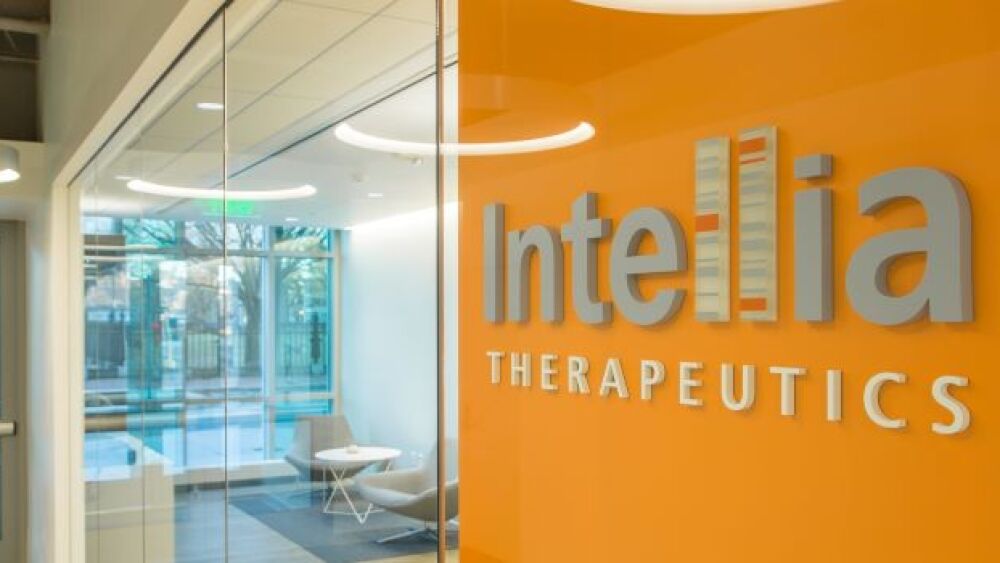Intellia Therapeutics and Regeneron Pharmaceuticals presented positive interim data from an ongoing Phase I trial of NTLA-2001 for transthyretin (ATTR) amyloidosis.
Courtesy of Intellia
Intellia Therapeutics and Regeneron Pharmaceuticals presented positive interim data from an ongoing Phase I trial of NTLA-2001 for transthyretin (ATTR) amyloidosis. The data was presented at the European Association for the Study of the Liver (EASL) International Liver Congress 2022 in London.
The data included extended follow-up information from 15 patients with hereditary ATTR amyloidosis with polyneuropathy (ATTRv-PN) receiving treatment in four single-ascending dose cohorts in Part 1 of the trial. The data demonstrated sustained durability of serum transthyretin (TTR) reduction through the last measured period in the ongoing observation. They support the therapy’s continued development.
Transthyretin amyloidosis (ATTR amyloidosis) is a rare, progressive and fatal illness. It is caused by mutations in the TTR gene, causing the liver to manufacture structurally abnormal transthyretin protein that tends to misfold. These damaged proteins build up as amyloid in the body, causing serious complications in the heart, nerves and digestive system. ATTRv amyloidosis typically occurs as polyneuropathy (ATTRv-PN), which can cause nerve damage, or cardiomyopathy (ATTRv-CM), which can cause heart failure.
NTLA-2001 utilizes CRISPR-Cas9 gene editing and is designed to be the first single-dose treatment for ATTR amyloidosis. It is dosed via a vein and edits genes inside the body using Intellia’s proprietary non-viral platform that deploys lipid nanoparticles to deliver a two-part genome editing system to the liver. The system includes guide RNA specific to the disease-causing gene and messenger RNA (mRNA) that encodes the Cas9 enzyme, which carries out the editing.
“Based on the interim data shared today, we believe NTLA-2001’s potential to be a transformational treatment for patients with ATTR amyloidosis is becoming clear,” John Leonard, M.D., president and CEO of Intellia, said in a statement. “The safety, depth of serum TTR reduction and durability profile demonstrated thus far highlights its potential for halting and reversing the disease after a single dose. These data further underscore the power of genomic medicines and bolster the probability of success across our broader in vivo genome editing platform. We look forward to progressing the clinical development of the first-ever systemically administered in vivo CRISPR investigational therapy.”
Big Week in the ATTR Space
It’s been a big week for ATTR. Earlier this week, AstraZeneca and Ionis Pharmaceuticals announced that their NEURO-TTRansform Phase III trial in hereditary transthyretin-mediated amyloid polyneuropathy (ATTRv-PN) hit its co-primary endpoints in a planned interim analysis at 35 weeks. The original partnership was inked in December to evaluate and develop eplontersen for ATTR-PN and amyloid transthyretin cardiomyopathy (ATTR-CM), with AstraZeneca paying Ionis $200 million upfront.
Eplontersen is a ligand-conjugated antisense drug, a very different type of technology from Intellia and Regeneron’s CRISPR in vivo gene-editing technology.
The interim analysis demonstrated the study hit its co-primary endpoints, meeting a statistically significant and clinically meaningful change from baseline for percent change in serum transthyretin (TTR) concentration, decreasing TTR protein production and change from baseline in the modified Neuropathy Impairment Score +7 (mNIS+7), a measurement of neuropathic disease progression.
“These encouraging data reinforce the safety profile of eplontersen and demonstrate clear evidence of its potential to provide much-needed therapeutic benefit to patients living with hereditary transthyretin-mediated amyloid polyneuropathy,” Teresa Coelho, M.D., a neurologist and neurophysiologist at Hospital Santo Antonio, Centro Hospitalar Universitario do Porto, Portugal, and an investigator for the NEURO-TTRansform trial, said.
The two companies plan to file a New Drug Application (NDA) with the U.S. Food and Drug Administration this year on the basis of the 35-week interim trial data.
The market for ATTR drugs appears to be getting crowded, although a one-time treatment or cure would be a lucrative one. Alnylam Pharmaceuticals received approval for Onpattro (patisiran) in 2018. That was the first RNA interference (RNAi) therapeutic to be approved by the FDA. Pfizer also has two ATTR cardiomyopathy drugs, Vyndaqel and Vyndamax, which brought in more than $2 billion in total sales last year, $909 million of it in the U.S. Last year, Novo Nordisk acquired Prothena Corp’s experimental AATR cardiomyopathy drug, PRX004, for $1.2 billion.
Ionis and its partner Akcea received approval for a first-generation drug for polyneuropathy of hereditary transthyretin-mediated amyloidosis, Tegsedi (inotersen), in 2018. The drug is linked to a risk of thrombocytopenia and glomerulonephritis, which requires significant monitoring for early detection and management, and is marketed with a Risk Evaluation and Mitigation Strategy (REMS).
At Intellia’s presentation of its CRISPR-based therapy data, Leonard said, “We’re excited to highlight the latest data from the study of NTLA-2001, our lead in vivo candidate being developed in collaboration with Regeneron Pharmaceuticals for the treatment of ATTR amyloidosis. At Intellia we are building a full-spectrum genome editing company by deploying the industry’s deepest and broadest toolbox. With each clinical data we’re demonstrating the immense power of CRISPR-based technologies which we believe has the potential to revolutionize the future of medicine.”





